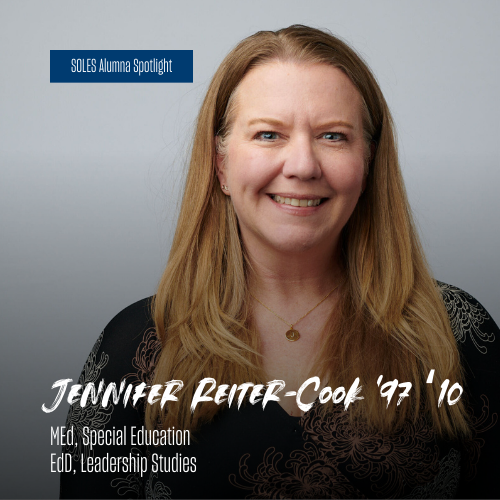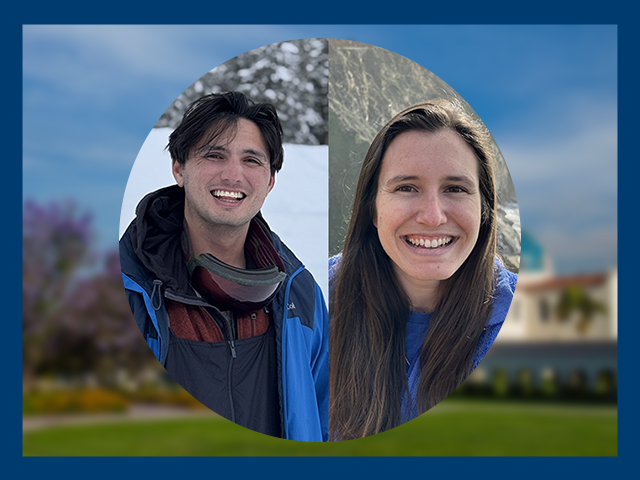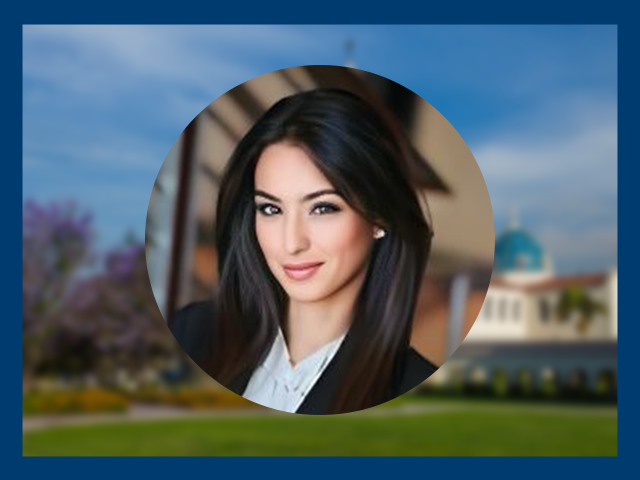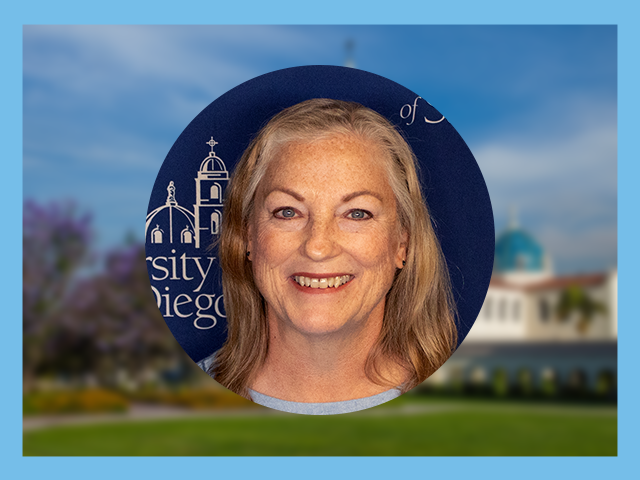SOLES Alumna Spotlight: Jennifer Reiter-Cook ‘97 (MEd), Special Education; ‘10 (EdD), Leadership Studies

SOLES Alumna Spotlight: Jennifer Reiter-Cook ‘97 (MEd), Special Education; ‘10 (EdD), Leadership Studies

Please tell us about your degree programs and why you chose to pursue those programs at SOLES.
I had just moved out here from Pennsylvania, and I knew I had to clear my credential, so I was looking at a few different universities. I wanted to combine my clear with a master’s, but I didn't know what I wanted to do. I was interested in counseling, special education, or curriculum and instruction, and through touring and talking to different university professors at the University of San Diego, I met Dr. Katie Bishop. Dr. Bishop was the lead for the moderate severe program under special education at the time. I met her and immediately connected and knew that that's what I wanted to do. It was definitely that one-on-one connection with her that ended up influencing me to get into special education.
For my doctorate, I knew I wanted to get my doctorate, but I just wasn't sure where. The SOLES EdD program allowed me to research any area that I wanted. I emphasized my research on charter schools, which isn't necessarily something that is a specific program anywhere. I was able to tailor my research, and I just loved the diversity of the program. People had been in the military, in business, and education. So there were a lot of different perspectives in the program, which I thought was great.
Who was your favorite professor from your programs?
For my master’s program, it's definitely Dr. Katie Bishop. For my EdD program, I think Dr. Fred Galloway and Dr. Bob Donmoyer were my favorites. Dr. Donmoyer was my chair, but those two had an influence on me and took an interest in my success in the program.
What were your favorite classes from both programs?
For the master’s program, I had no experience in special education. I think my favorite class was the very first class I took, which was just kind of an introductory class. It's actually where I had to go out and do field observations. That's when I knew I wanted to work with kids with more significant disabilities, because of my field experience. That impacted the trajectory of my future – getting the double credential, working with particular students, and such.
For the EdD program, the qualitative and quantitative research classes were probably my favorites. Being able to formulate my dissertation and figure out ways to demonstrate data has carried through to support me in different ways in my career, too. At the time, I don't know if I would say the research classes were my favorites, but now I know they had a positive impact, both then and now.
Can you share a little bit more about your fieldwork?
In the master's program, I initially just did observations. And a lot of times when you go into special education classrooms, the teachers are shorthanded. Instead of doing an observation, you're actually kind of jumping in and helping support the teachers. That's where I got my first sense of what it was like to work with students with disabilities. Even in my student teaching on the East Coast, I didn't have any kids in my student-teacher classrooms who had disabilities. I only had one student who was a second language learner, so moving out here to California, it was all sort of new to me. I got a job after completing nine units of my master’s program as a special education teacher in the Chula Vista Elementary School District. I was working with my own students instead of doing the actual fieldwork for the program. Dr. Bishop would come into my classroom, observe me, and work with me. I didn't have a formal student-teaching experience, because I had my own classroom at the time.
How were you able to balance having your own classroom, while still having classes to attend?
Sometimes I took back-to-back classes at night. I didn't have kids at the time and I wasn't married, so that was probably helpful. Having my own classroom helped because I could take what I was learning in class and apply it the next day with my students. I feel like it helped me because I only had nine units of courses, so I was still brand new to special education. The ability to go to class at night while I was teaching during the day was helpful. And then with the doctorate program – I got my doctorate in 2010 when my son was seven years old and my daughter was two. I had some experience having a family and trying to balance everything else. But it helped to be able to talk to my professors about that. As you get into the doctorate program, people usually have some life experience, and they're working, and they typically have families, so connecting with other students was helpful, as well as working with the professors who were pretty understanding of that as a student in the doctoral program. Dr. Donmoyer, especially, kept a fire under me, kept me going, and helped me stay motivated to finish the program, which was important to me.
Were you involved on campus as a student?
I was a grad assistant while in the doctoral program, and I taught some undergraduate classes in leadership studies. That was great because I already had some experience teaching at the college level, but it was all graduate students or students in teacher credential programs, so that was my first time teaching undergrads. It was a great experience to be able to take what I was learning in the leadership studies doctoral program and be able to connect it back to the undergraduate students.
Where is your favorite place on campus?
The Immaculata is my favorite place because my husband and I got married there, and both of our kids were baptized there. It was also a place I'd love to stop by while I was on campus. A lot of my classes were at night, but if I was on campus during the day, it was a special place to be able to stop in and take a minute to reflect or meditate. The Immaculata is definitely special.
Can you share a bit about your dissertation?
My dissertation was on charter school closures in California. I looked at nine different charter schools across the state that had closed, and I compared the differences between the legal reasons that the authorizers closed the schools or revoked the charter petitions, and the reasons why the leaders that were there at the time felt that their school had been closed. I initially sent out some surveys to all of the leader contacts I could find that had been the leaders of charter schools that had closed, and then set up qualitative interviews with the nine schools. The schools were as far north as Sacramento or a little further to Palm Desert, to down here in San Diego. I was able to compare and contrast what the on-the-ground reasoning was for why the school closed, and what the experiences were of that leader, and then recommend any sort of support for either current charter school leaders or authorizers to use that information to help the sustainability of charter schools
Did you do any work with charter schools once you completed your doctorate?
For the past 10 years, I’ve worked for the California Charter Schools Association (CCSA). It's a nonprofit and statewide organization that supports advocacy and policy surrounding California charter schools. I'm the Managing Director of School Development, which means I help people across the state start new charter schools. There’s a definite direct line between my research and my doctorate, and what I do even today
What are your favorite memories from your time at USD?
For my master’s, I feel like I made a lot of connections with my peers, and just being able to to support each other in the classroom. Particularly, taking classes with Dr. Bishop and having her come into my classroom gave me a sense of her investment in what I was doing, and she gave me the support that I needed - above and beyond. Especially because I was a brand new teacher and there weren't any resources at the time like there are now for brand new teachers; I feel like she really helped me with that.
With my doctorate, again, it was the personal connections I made with professors, and especially my dissertation committee. They just had a genuine interest in what I was doing, understood my passions, and were always willing to meet and talk with me. My favorite memory wasn’t one class or one particular moment, but the sense that I always felt like I was an individual, that I was being supported, and that my professors really did know what I was passionate about and what I wanted to do. That was true for both programs.
Can you share what your journey has been like since graduating?
When I got my doctorate in 2010, I continued to be a part-time professor at Point Loma Nazarene University in their Teacher Credential Program and their Master’s in Education Program. In 2013, I started working for the California Charter Schools Association. Three years after I got my doctorate, I was thinking about being a full-time professor. I spent some more time at PLNU, and then the opportunity came up with CCSA, and I've been there ever since. I had my 10th anniversary on July 1st.
I've always been on the school development team at CCSA, supporting people who are starting new charters. I started as a manager and just worked with schools south of Los Angeles, and since then I've progressed and been promoted. Last July, I was promoted to Managing Director of School Development, and I'm the only person who supports our organization’s school development now. I work with schools across the state and I also run a cohort program for people who are interested in starting charter schools. We do a virtual cohort that lasts two years where we support and connect new people that are interested in starting a charter school with professionals and experts in the field. I also run several programs for our conference surrounding school development.
How long and rigorous is the process of trying to create a charter school?
At a minimum, it takes two years. And that's if you have a solid team and a lot of time to dedicate to the process. Typically, it takes about three years because once you submit a petition, it can take over six months to get authorized by a district or county. It's a long process. During the first year of the cohort, we offer modules online twice a month, and we have them do deliverables and demonstrate how they’re making progress with their petition. Then the second year is really about getting them to submit their petition and helping them through that authorization process. We assume it's going to take two years based on the length of our program, but sometimes they have to delay another year.
This will be our fourth cohort. I'm actually in the middle of doing a dissection of our analysis of all of our schools that have participated and who's open and who has been successful and viable. I would say it's a mix of people that open and people that delay. People who tend to realize it's too much for them to do at this point sometimes come back to us after a couple of years and say, “We're ready to start the process again!” But it can be a pretty intimidating process, for sure. So I hope, with my role, I can help alleviate some of that and get them connected with the right people to create high-quality school choice within their communities.
How has your education from SOLES impacted your career and career goals?
I still rely on and utilize my Master's in Special Education, even while working with charter schools, because a lot of people who want to start charter schools don't have experience in special education. For my doctorate, even though the coursework wasn't about charter schools (although I'm using my research), I do use the leadership pieces that were part of that program in my work. I've been mentoring other people in a program called “Women Unlimited”. I mentor people who are coming into the work world and talk about their brand, how to present themselves, and all those kinds of things. I recently became a court-appointed special advocate for foster youth. I see a lot of my learning coming back to that in terms of leadership, as well as my knowledge in special education and my knowledge of the education worlds or landscape in general, which impacts all of those different areas. I feel that I can offer something unique from my education in all of those different areas. I do feel like I fall back on both of those programs, even though I'm not teaching, but while I’m still working in the broader education world, it's been really, really helpful. It’s helped me move forward in my career, and also take up other opportunities, whether they are volunteer opportunities or other opportunities where I can lend my expertise.
In terms of your connection to USD and SOLES, what are the ways that you are still involved and connected – as a parent, as an alumna, etc.?
My son is currently a junior at USD. He loves it. When he started as an undergrad at USD, I enjoyed Homecoming and doing the pinning ceremony with him, which was very special. Now, I enjoy being able to go grab lunch with my son on campus and stay connected in that way. I think his going to school at USD has rejuvenated, or reignited, my connection to the university on a more personal level.
I still supervise student teachers, which I’ve been doing for a long time with Dr. Amanda Roth in the SOLES program. Staying connected with Dr. Roth and Dr. Reyes Quezada has been helpful to know what's happening in the program. I've taught courses on and off in SOLES, as well, for the Teacher Credential Program.
What advice would you give to current students in either program?
Take advantage of the fact that the professors are willing to spend a lot of time with you and work with you to make sure you are successful. Don't be shy about meeting with them and taking some time outside of class to talk with them, because anyone that I've had as a professor at USD has been willing to take that time. And I don't think it's always that way in every program at every university. It's the same advice I give my son: take advantage of going to office hours, make meetings with your professors, and help them get to know you on a personal level and what your interests are. Maybe they have some networking opportunities for you or some ways for you to get involved that might help you with your area of interest. That would be my biggest piece of advice.
Contact:
Amanda Gonzales
amanda@sandiego.edu
(619) 260-4539



